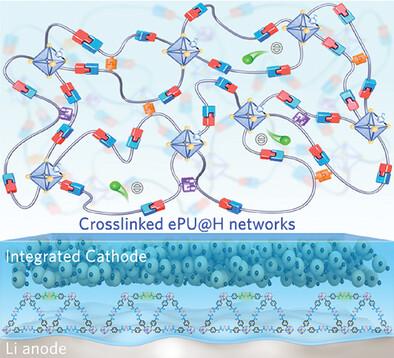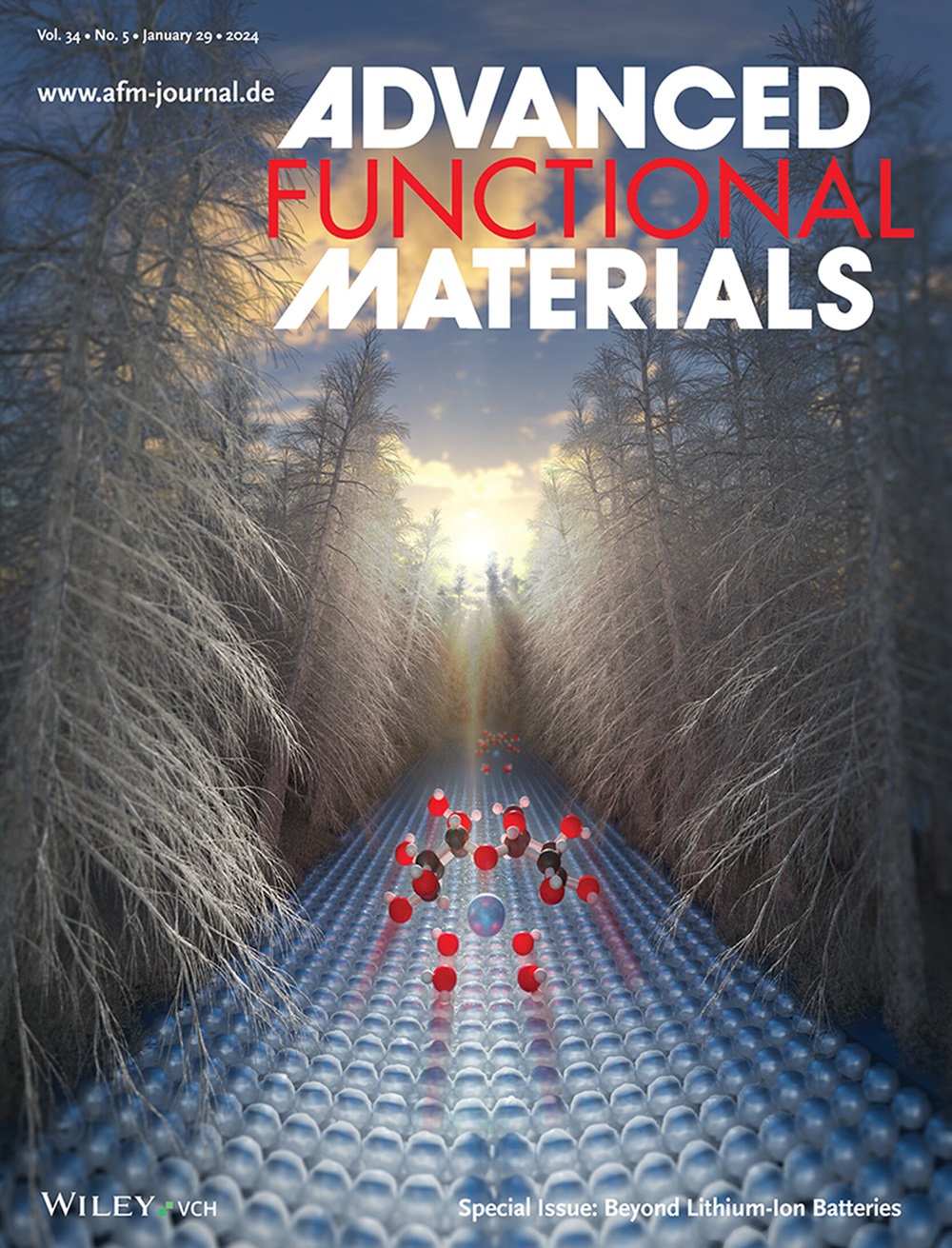Metal-Organic Framework-Derived Elastic Solid Polymer Electrolytes Enabled by Covalent Crosslinking for High-Performance Lithium Metal Batteries
IF 18.5
1区 材料科学
Q1 CHEMISTRY, MULTIDISCIPLINARY
引用次数: 0
Abstract
The key issue in utilizing solid polymer electrolytes for high-energy-density lithium metal batteries is to balance the conflicting demands of superior processability, adequate ionic conductivity, and mechanical stability. Inspired by molecular structure design, a metal-organic framework-derived polyether poly(urethane urea) solid polymer electrolyte (denoted as ePU@H SPE) has been synthesized via a facile polycondensation method involving covalent crosslinking. The reduced crystallinity and numerous polar groups in ePU@H SPEs enhance Li salt dissociation and create efficient Li+ ion diffusion channels, yielding remarkable ionic conductivity (1.48 × 10−4 S cm−1). The polymer backbones, incorporating covalent bonds and dynamic hydrogen bonds, provide superb mechanical strength (5.12 GPa), high toughness (1240%), and excellent resilience, which suppress lithium dendrite growth and buffer electrode volume fluctuations during cycling. Leveraging these attributes, the well-designed ePU@H SPE enables ultra-high durability in lithium plating/stripping over 2300 h. Moreover, the integrated LFP|ePU@H|Li batteries, generating delicate electrode/electrolyte interfacial contact, deliver an exceptionally long lifespan (86% retention over 500 cycles at 1 C). Moreover, the LFP|ePU@H|Li pouch cell operates reliably even under severe deformation and external damage. Impressively, the stable cycling performance of full batteries incorporating high-voltage LCO and high-capacity S cathodes further verifies the significant potential of advanced ePU@H SPEs for practical applications.

通过共价交联实现金属有机框架衍生弹性固体聚合物电解质用于高性能锂金属电池
利用固体聚合物电解质制造高能量密度锂金属电池的关键问题是如何平衡出色的加工性、足够的离子导电性和机械稳定性这三者之间的矛盾。受分子结构设计的启发,我们通过共价交联的简便缩聚法合成了一种源自金属有机框架的聚醚聚(氨基脲)固体聚合物电解质(简称 ePU@H SPE)。ePU@H 固态聚合物电解质的结晶度降低,且含有大量极性基团,这增强了锂盐的解离,并形成了高效的锂离子扩散通道,从而产生了显著的离子电导率(1.48 × 10-4 S cm-1)。聚合物骨架包含共价键和动态氢键,具有超强的机械强度(5.12 GPa)、高韧性(1240%)和出色的回弹性,可抑制锂枝晶的生长和缓冲电极在循环过程中的体积波动。此外,集成的 LFP|ePU@H|Li 电池可产生微妙的电极/电解质界面接触,具有超长的使用寿命(在 1 C 温度下循环 500 次,保持率为 86%)。此外,LFP|ePU@H|锂袋式电池即使在严重变形和外部损坏的情况下也能可靠运行。令人印象深刻的是,包含高电压 LCO 和高容量 S 阴极的全电池的稳定循环性能进一步验证了先进 ePU@H SPE 在实际应用中的巨大潜力。
本文章由计算机程序翻译,如有差异,请以英文原文为准。
求助全文
约1分钟内获得全文
求助全文
来源期刊

Advanced Functional Materials
工程技术-材料科学:综合
CiteScore
29.50
自引率
4.20%
发文量
2086
审稿时长
2.1 months
期刊介绍:
Firmly established as a top-tier materials science journal, Advanced Functional Materials reports breakthrough research in all aspects of materials science, including nanotechnology, chemistry, physics, and biology every week.
Advanced Functional Materials is known for its rapid and fair peer review, quality content, and high impact, making it the first choice of the international materials science community.
 求助内容:
求助内容: 应助结果提醒方式:
应助结果提醒方式:


